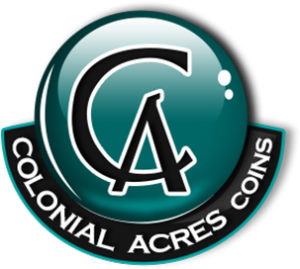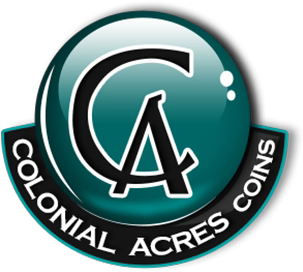Last updated on May 2nd, 2024 at 03:31 pm
Last Updated on May 2, 2024 Posted by Colonial Acres Coins
Whether you’re new to collecting or a seasoned collector, knowing how to evaluate coins is essential for informed decisions. Join us as we explore methods to determine value and significance, discussing factors like rarity, condition and market demand. Gain valuable insights to assess and appreciate the worth of your coin collection.
When you think you have a valuable coin and want to sell it, the natural thing to do is look up the coin online. You may find similar items for sale on auction sites like eBay, and you may be impressed and excited by the price tag you see. Unfortunately, many people drastically overestimate the value of the coins in their collection because internet sites are not the best way to evaluate a coin collection.
Here’s what you need to know to avoid the disappointment that comes when a buyer tells you a certain coin is not worth as much as you thought.
What to Avoid to Get an Accurate Evaluation for a Coin Collection
Most people only engage in light research to evaluate a coin’s worth. Using websites like Etsy, Pinterest, YouTube, or coin apps to find the value of a coin is never a good idea because the items you see often aren’t evaluated by an expert and can be very misleading.
These platforms may be a good place to stoke your interest in coins, but you may be disappointed to learn that your coin is only worth a tiny fraction of the price you saw online if you take it to an expert to sell.
Remember that rarity is the greatest factor in determining the value of a coin. Any amateur coin dealer can go online and list a piece for a high price, claiming it is rare, but that doesn’t mean that the statement is true. The condition of your coin and the metal used to make it also play a role in valuation. Only an expert can evaluate a coin accurately, so doing deeper research is necessary.
What To Do To Get an Accurate Evaluation for a Coin Collection
Fortunately, there are multiple avenues available to get an accurate evaluation of the coins in your collection. By exploring diverse methods and resources, you can unlock the true worth of your cherished coins, unveiling their historical significance, rarity, and market demand. Whether you choose to consult professional coin appraisers, published price guides, or join numismatic communities, the path to obtaining accurate evaluations promises to be a rewarding experience.
The easiest method is to take the items in question directly to a reputable shop or dealer. The expert understands the intricacies of grading and valuation, so you can save time by doing less research. When it comes to grading coins accurately, reputable coin dealers like Colonial Acres possess the expertise, even though they may not provide their own official certification. The assigned grade is typically written or typed on the corner of the coin or banknote holder when the dealer offers it for sale.
However, it’s also beneficial for collectors to have a basic understanding of the grading system themselves. By familiarizing themselves with the grading criteria, collectors can make informed decisions and have a better grasp of the quality and value of their coins or banknotes. The Sheldon Grading Scale assigns each coin a letter and number up to MS-70, which is the perfect score for a coin. The higher a coin’s rating, the higher the value.
If you want to be prepared for how much a coin shop will pay to buy your coins it’s important to do some deep research. Check out some reputable auction sites like iCollector or Heritage Auctions. You can also use eBay, but only compare the data from items that have sold (check this box in the search options on the left). This information gives you a general idea of how much people are willing to pay for specific coins.
Next, look up your coin’s value from a certification company. Reputable certification companies include ICCS, PCGS, NGC, or CCCS for coins, or for paper money, BCS, PMG, or Legacy. Some of these offer online price guides. Even if they don’t, when perusing online listings, you know that the grades these companies assign are more reliable than those given by a vendor or collector.
Finally, look up the coin in reputable coin magazines or catalogues. Publications such as the US Red Book, Coin World, the Charlton guides, and Canadian Coin News give accurate estimations for the value of coins. It’s important to note that the prices mentioned represent full retail prices, which reflect the amount a dealer like Colonial would typically sell the coins for after buying them from the public.
If you choose to sell your coins to a dealer like Colonial, it’s essential to understand that the amount offered will usually be less than the indicated retail price – say half. Otherwise, the dealer won’t make any money! Factors such as market conditions and dealer margins can affect the final price offered for your coins.
Pay Attention To Spare Change Lying Around the Home
One exciting aspect to keep an eye out for is old coins that actually contain silver. These coins, particularly Canadian dimes, quarters, 50-cent pieces, and dollars minted before 1968 (and some 1968 dimes and quarters), hold intrinsic value due to the silver content they contain. This means that their worth extends beyond the nominal value imprinted on them. So, next time you sift through your spare change, pay attention to these silver coins that may be a hidden treasure in your collection.
Visit Colonial Acres Coins Today
Failing to do thorough research on the grade and condition of your coin collection can leave you with the idea that it is worth much more than it actually is, so it’s important to speak with an expert to get an accurate valuation. The staff at Colonial Acres Coins knows how to accurately value coin collections, so pay us a visit today and gain a realistic understanding of your coin collection’s true value.




